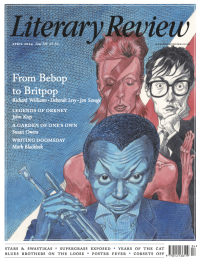Caroline Moorehead
Traitor or Humanitarian?
Broken Archangel: The Tempestuous Lives of Roger Casement
By Roland Philipps
The Bodley Head 400pp £25
What people remember about Roger Casement is his terrible end. Accused of trying to raise a brigade among Irish prisoners of war with the help of Germany to fight the British in Ireland, he was hanged on 3 August 1916 as a traitor. But the man described by T E Lawrence as having ‘the appeal of a broken archangel’ was for most of his life a compassionate, highly sensitive and courageous social reformer and anti-colonialist. Roland Philipps’s meticulous and sympathetic portrait is not of a man seeking to betray his country but of a patriot and a romantic defeated in the end by treachery. The only small oddity in his fine book is its organisation: Casement’s birth and childhood do not come until page seventy-nine, by which time Philipps has already covered some twenty years of the period Casement spent as an adult in the tropics.
Casement was nineteen, the son of an impecunious Protestant former army officer and a Catholic mother, when he arrived in Boma in the Congo as purser on a steamer. Orphaned at twelve, he had received little education. The mineral-rich Congo was a so-called free state administered by some three thousand Europeans, but in practice it was King Leopold of Belgium’s personal fiefdom, ruled over with exceptional greed and brutality. By the end of the 1880s, Casement was in charge of a Baptist mission station, where he was liked by his fellow workers and loved by the Congolese. Joseph Conrad, who arrived in the Congo to take command of a riverboat, found him companionable and upright. Increasingly outraged by the brutalities he witnessed, Casement wrote furious letters home and eventually produced a fifty-thousand-word attack on Leopold’s savage rule. Conrad called his own Heart of Darkness ‘an awful fudge’ in comparison. Philipps paints a vivid picture of the frenzied Scramble for Africa, and of the adventurers, slavers and ivory hunters who joined the European nations in their rampage for loot.
For a while, Casement served as a customs officer and as a commissioner for the British Foreign Office in what is now Nigeria, and then as consul-general in Brazil, where he collected material on the atrocities practised by the Peruvian Amazon Company against indigenous peoples, no less inhuman than those

Sign Up to our newsletter
Receive free articles, highlights from the archive, news, details of prizes, and much more.@Lit_Review
Follow Literary Review on Twitter
Twitter Feed
It wasn’t until 1825 that Pepys’s diary became available for the first time. How it was eventually decrypted and published is a story of subterfuge and duplicity.
Kate Loveman tells the tale.
Kate Loveman - Publishing Pepys
Kate Loveman: Publishing Pepys
literaryreview.co.uk
Arthur Christopher Benson was a pillar of the Edwardian establishment. He was supremely well connected. As his newly published diaries reveal, he was also riotously indiscreet.
Piers Brendon compares Benson’s journals to others from the 20th century.
Piers Brendon - Land of Dopes & Tories
Piers Brendon: Land of Dopes & Tories - The Benson Diaries: Selections from the Diary of Arthur Christopher Benson by Eamon Duffy & Ronald Hyam (edd)
literaryreview.co.uk
Of the siblings Gwen and Augustus John, it is Augustus who has commanded most attention from collectors and connoisseurs.
Was he really the finer artist, asks Tanya Harrod, or is it time Gwen emerged from her brother’s shadow?
Tanya Harrod - Cut from the Same Canvas
Tanya Harrod: Cut from the Same Canvas - Artists, Siblings, Visionaries: The Lives and Loves of Gwen and Augustus John by Judith Mackrell
literaryreview.co.uk